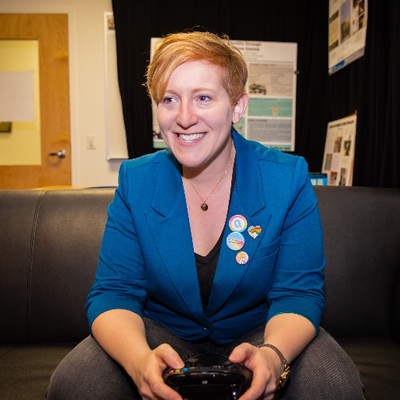I’m really looking forward to the Society of Cinema and Media Studies (SCMS) conference this year, which is happening in Chicago, 3/21 – 3/26. It’s the first time that I’m chairing a panel at the event — “Video Games and Queer Affect: Empathy, Embodiment, Exile, Economy.” My co-presenters are Christopher Goetz, Whitney Pow, and Diana Mari Pozo, and I can’t wait to hear their presentations. Maybe this is how putting together panels always goes, but I feel both excited and selfish. The intersection of video games and queer affect is an area I’ve been interested in exploring for a while now, and I get to be part of an entire session about it.
Now that the SCMS 2017 preliminary program is out, it looks like we’re presenting at 3:00 pm on Thursday, 3/23. If you’ll be at the conference, you should definitely come! Here’s the listing, with the talk titles:

And here’s a blurb from our panel proposal, which gives you a sense of how we’re approaching the issue of video games and queer affect:
Inspired by the burgeoning field of queer game studies, this panel explores the relationship between video games, queerness, and affect. Because of the medium’s interactive nature, video games represent a rich site of investigation for scholars interested in the interplays between media and affective experience. Recent work, like Katherine Isbister’s How Games Move Us, has approached the phenomenology of play through design. Simultaneously, with the rise of virtual reality, the rhetoric surrounding contemporary video games has shifted notably toward “empathy.” The papers included in this panel respond to these developments by addressing video games and affect through queerness.
This work reflects a variety of queer frameworks, many drawn from film and cultural studies, and investigates diverse inroads into the critique of digital media through queer affect. The games addressed in these papers are similarly diverse, ranging from mainstream titles like the Pokémon series to independent games like Anna Anthropy’s Dys4ia, demonstrating the relevance of emotion, embodiment, and queerness across the medium. Together these papers issue a call for further research into the nuanced interrelations between queer affect and video games.
Hope to see you there!

